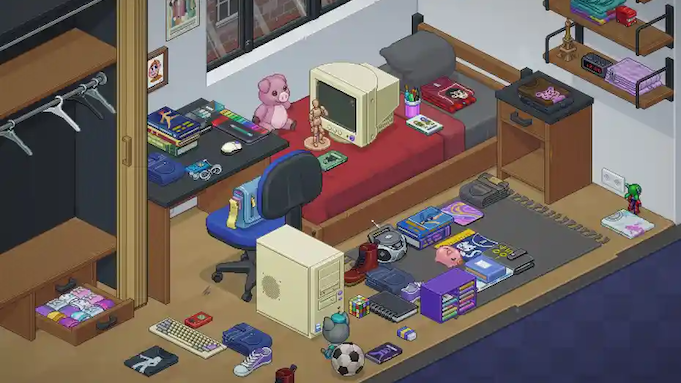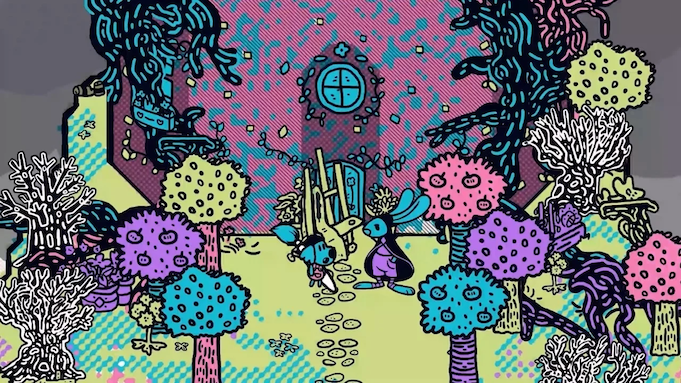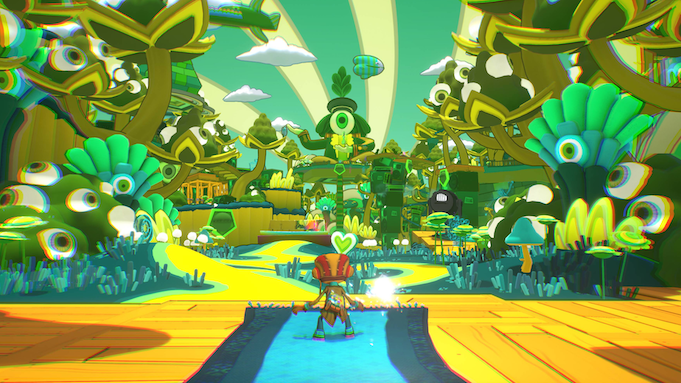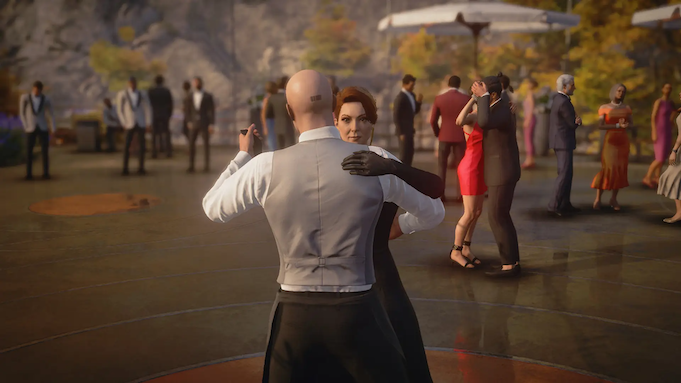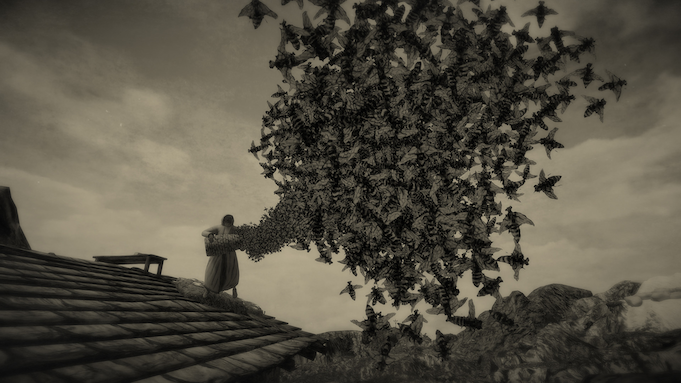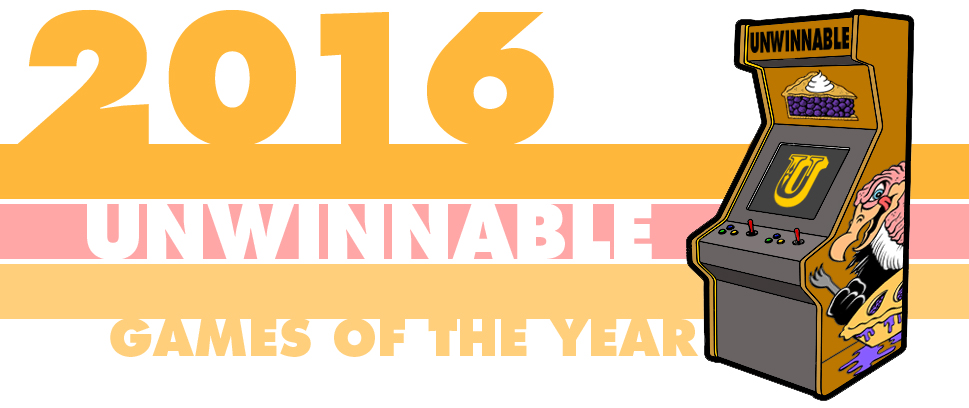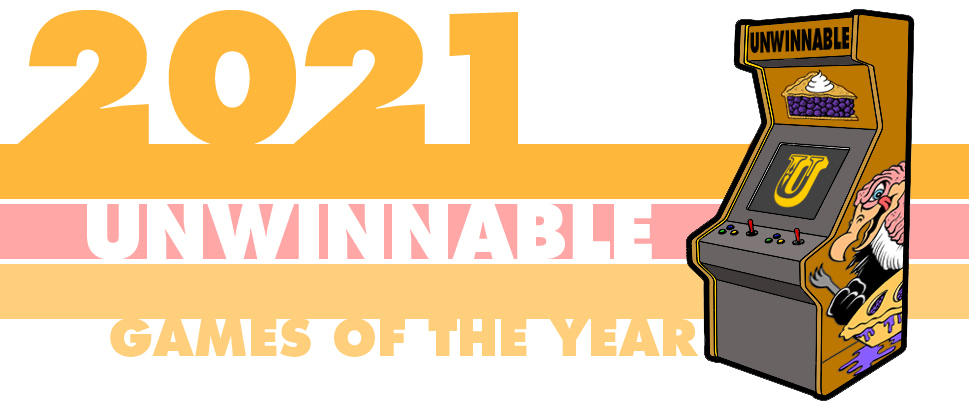
The Best Games of 2021
Well, 2021 kinda turned out to be “2020, but again and more,” didn’t it? Just like last year there were tons of extremely shitty goings-on in the industry (ABK’s strike fund is still going as of this writing), the global pandemic has hit its second (eighth?) wind and for most of us our frayed nerves have frayed nerves at this point. But videogames!
Honestly though, 2021 was yet another year full of great games – some brand new, and some seeing a triumphant return after literal (as in, not hyperbolic) government censorship. Hell I’ve even managed to play a couple of them myself this year.
Also I’m going to abuse my power to specifically shout out Eastward, which did get a few votes but not enough to make it into the Top 10. That game is just so pretty to look at and listen to.
– Rob Rich, Curator
Unpacking
I’ve often found a zen relaxation in putting things away just so. Decorating a small console table in the living room for Christmas was a recent treat. Ceramic Christmas tree on the right, Billy Baloney in his Pee-wee’s Christmas Special getup just off center with his arm slung casually over a stack of books, glitter reindeer and krampus circus punk cozying up together on the side, pine-scented candle next to them, nog-drunk Santa and elf figurines sleeping it off below that, Taco Bell snow globe front and center (natch).
The developers of Unpacking capture this vibe completely. It’s gorgeously designed – the isometric view and pixellated objects calls to mind the games I used to play on my old Macintosh Performa in the late 90s(!) – but the real treasure is the pitch-perfect sound design. Setting objects down is the most satisfying gameplay move I experienced all year, with the sound changing depending on the surface where the player places them. The ambient sounds are great, too, and tie in beautifully to the emergent storytelling that develops over the course of the game. That’s actually where Unpacking really shines – the objects we carry and keep tell a story of our life. Seeing what the unseen protagonist carries with her from living space to living space, and more meaningfully, where she keeps certain things at certain times in her life tells a surprisingly rich story without any words at all.
– Sara Clemens

Ratchet and Clank: Rift Apart
In the first year of a new console launch, everyone is looking for a game that will reassure them that their purchase was justified. For me, Ratchet and Clank: Rift Apart checks that box. Just like the best of the Pixar films, Rift Apart finds a comfortable balance for both children and adults to revel in the misadventures of our cute, furry protagonists and their astute robot companions.
The Ratchet games have always done one thing right: lean into the fantastical to create surprising and humorous gunfights. Rift Apart doubles down on this approach, showering the player with a wide assortment of guns and gadgets to wreak havoc on enemies. While the story of Rift Apart doesn’t reinvent the wheel, Rivet, the female co-protagonist of Rift Apart, is a welcome addition to the franchise.
There’s some growth happening in this entry narratively as well; it’s a smart choice to focus on the isolation Ratchet has felt being the supposed last of his kind. Even smarter to grapple with something all of us must do as we get older in one way or another: rethink what family means for us. The found family story beats stay fairly light, but echo as a broader idea I hope the franchise continues to explore.
– Phillip Russell
Chicory
Chicory is a beautiful, interactive fable. As the self-named protagonist, Spaghetti in my case, you must unlock progressive areas and challenges that reminded me of classic Zelda.
Two things make Chicory very special. First, the black-and-white world is brought to life by the game’s core mechanic of coloring. That includes palettes that change as you explore different regions of the world, something that most games already do behind the scenes but that makes the coloring feel even more personal. Second, the game deals head-on with challenging themes not just of self doubt, but of full-on panic attacks and other serious symptoms of mental illness. This is never downplayed or swept away, making it a thoughtful contrast to a world where many things are still billed with “crazy” or “insane” as descriptors.
On top of all that, Chicory is also a beautifully realized world full of memorable writing and NPCs. The main storyline takes you all over the charming world of Picnic, where all the other characters are also named for foods. You get to design new art for businesses, take art lessons and complete other tasks for residents. This is a hero’s quest with a sense of wonder, play, and good humor—even when confronting some of life’s most difficult emotions.
– Caroline Delbert
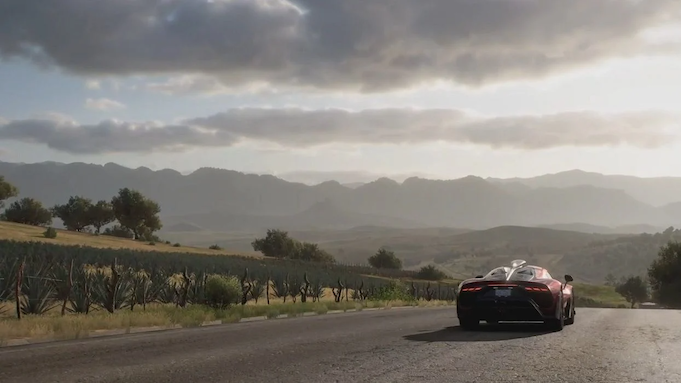
Forza Horizon 5
I’m a pilot, so I’m of course really into cars. I mean, these things aren’t necessarily connected, but I can’t think of any pilots who aren’t into cars. In any case, I fell in love with Forza Horizon 5 this year. Featuring several hundred cars, the game has everything that somebody like me could possibly want. You’ve got muscle cars. You’ve got rally cars. You’ve got super cars. The game is basically the weirdest, wildest and wackiest automotive exhibition that you’ve ever seen.
But this doesn’t mean that it can’t excel in other ways. The design for example is really a step above. Something which stood out to me in this respect is how the game leads you around the map in such a seamless way. The result is that you’re constantly crisscrossing the map, starting in one place and winding up somewhere else. I should also point out the accessibility features. Take this as the tip of the iceberg, but the game automatically detects your skill level and asks if you want to increase or decrease the difficulty.
I thoroughly enjoyed my time with Forza Horizon 5. I’m clearly a car person, so your mileage may vary, but I think that you’d be remiss not to pick this one up. I can’t recommend it enough.
– Justin Reeve
Psychonauts 2
Psychonauts 2 gave me exactly what I wanted out of a Psychonauts game, and that was to set things on fire with my mind. Beyond that, I enjoyed that Psychonauts 2 seems more aware of the dangers of tampering with a person’s mind than its predecessor. Just because you can jump into a person’s head and forcibly change the way they operate or view the world doesn’t mean you should, after all.
Sometimes your problems can be fixed by putzing around a person’s inner consciousness, but in some cases (like convincing Forsythe to take bigger risks) tampering with a person’s head does more harm than good. The original game touched on this briefly with the Milkman level, but I appreciate that Psychonauts 2 actually makes you address the wrong you did to your victim and work to repair it, rather than leaving them in a psychotic state as you scurry along to the next level.
On top of this, the game more evenly distributes the player’s time between the real and mental worlds than its predecessor, giving you bigger areas to explore and more in-depth interactions with familiar faces and new characters. The music is good, the platforming is much improved, you can tweak your powers and above all it’s sincerely fun to play.
– Gingy Gibson
Hitman 3
Hitman 3 is the culmination of the World of Assassination saga that began in 2016. Five years later, Hitman has not only never felt better, it’s become a series greater than any of its predecessors would have you believe.
Now, more than ever, Hitman is a game about fluency. You’re welcomed to a locale, your targets and objectives are made clear to you, you begin your work. But each time you approach a level you can begin to appreciate the routines of the NPCs, you find efficient ways to stash tools and weapons, gather others, and implement them. Soon enough, you earn new tools through the experience system and with enough patience and work, you can start to do things like assassinating all of the targets and completing the objectives without being seen all while wearing your icon suit.
But Hitman 3 does all of this with ease. It isn’t a flashy game, although it is gorgeous. Instead, it effortlessly assembles stages for you to solve and murder your way though. Each level has an almost diorama feel, living puzzle boxes where the more you learn, grow, and earn the further you can climb the ladder to becoming the ultimate bald badass.
– David Shimomura
Metroid Dread
Metroid Dread was a quietly-canceled DS game that never actually appeared, but became significant to fans as the point where Nintendo decided 2D Metroid was dead. Seeing the title again in 2021 was extremely exciting and surprising. However, I’ve played so many great Metroid-likes in the indie space that I had doubts they could do anything hot.
I was wrong – Dread has maybe the most satisfying gameplay of the entire series, with huge quality-of-life upgrades to mobility and the map. I was worried about the EMMIs being a constant Mr.X-like presence, but they’re relegated to specific sections that make you think “oh no, I have to do an EMMI run” that bring some horror back to Metroid. I was also worried about how “talky” the series has been since Fusion introduced Adam to dull Samus’ coolness. Thankfully, Dread prefers to show us Samus’ personality through excellent cutscenes rather than embarrassing internal monologs.
It’s not perfect – the music is just okay, the areas are not very distinct and kind of blend together and traversal is arbitrarily difficult due to blocked paths – but it’s a better 2D Metroid than I ever expected to see again.
– 2 Mello
Mundaun
Horror is an idea. It can exist just as plainly in the space of a few written words or hastily sketched shapes as it can in something more polished and baroque. Mundaun is not just a testament to the power of minimalism and limited scope but to the ways original thinking elevates art more seductively and powerfully than anything else. And Mundaun feels like absolutely nothing else. From its use of a nearly extinct language, to its surreal and unnerving art style, to the ways it brilliantly uses low-poly 3D art to add startling dimensionality and shape to its charcoal textures, it feels like a singularly conceived and inimitable piece of art.
In its clever use of the first person camera to unseat and alarm the player, Mundaun pushes the entire industry forward, including even the DOOMs and Call of Duty’s. It gives us astonishing new tools with which to situate ourselves in its virtual space, to explore its dark crevices and blindingly bright mountain peaks.
Mundaun is a genre defying and defining work, boldly confident in its own oddity, that will stay etched in my imagination for some time.
– Yussef Cole
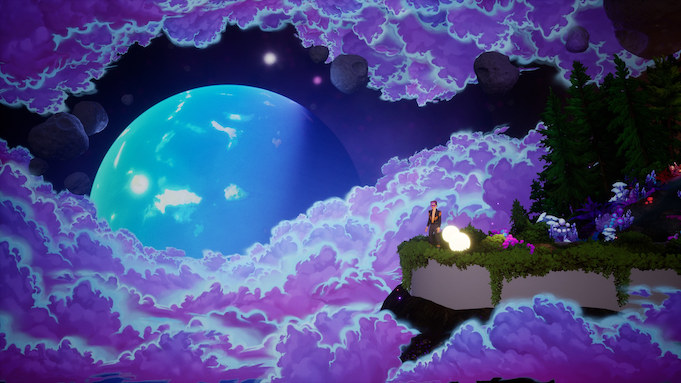
The Artful Escape
The Artful Escape has been on Unwinnable’s radar since the summer of 2015 when it was previewed in Weekly issue 54. This debut title from Australian musician-turned-game designer Johnny Galvatron and his studio, Beethoven & Dinosaur, looked promising. It turns out that initial interest was warranted. You may be wondering what makes The Artful Escape deserving of the number two spot, considering how many high-profile titles have shipped in 2021. On the surface, it appears to be a narrative-driven side-scrolling platformer about a wandering guitarist with superpowers. At its heart, it’s about subverting expectations.
It starts off placing players in the shoes of fledgling folk musician Francis Vendetti as he prepares for his first show in a mountainside tourist town in Colorado. Feeling smothered by the pressure of his world-famous songwriter uncle’s legacy, a series of events leads him on an intergalactic journey of self-discovery – shedding his twee folk aesthetic for something more authentically his own. This is a story about navigating the distance between who we are, what others want us to be and where we want to go. And in a time where people everywhere are asking hard questions about what they really want from their lives, it’s struck a chord.
– Ben Sailer
Devotion
You’re probably asking right now: Why is Devotion on a Best Games of 2021 list? Wasn’t it released in 2019?
Sure. But, it wasn’t long until it became virtually unavailable to buy online. This year, the developer, Red Candle Games, self-published the game, opening it up for everyone to play again.
Devotion didn’t get the chance to receive the attention it deserved during its release year, so we wanted to give it that opportunity this year now that folks can access it. And it turns out that so many of us were on board with the idea it won our Game of the Year.
Like Red Candle Games’ other work, Detention, Devotion is steeped in Taiwanese culture and history. The devs explore how a certain place and time shape their characters’ relationships in the most intimate setting of all – home.
Devotion’s psychological horror keeps you wondering what’s around the corner, but it comes from a woefully tender source. As the main character searches for his daughter, he slowly remembers the conflicts in his family that lead him to his situation. And, most tragically of all, one girl is caught among it all, trying desperately to make her parents happy.
– Melissa King
